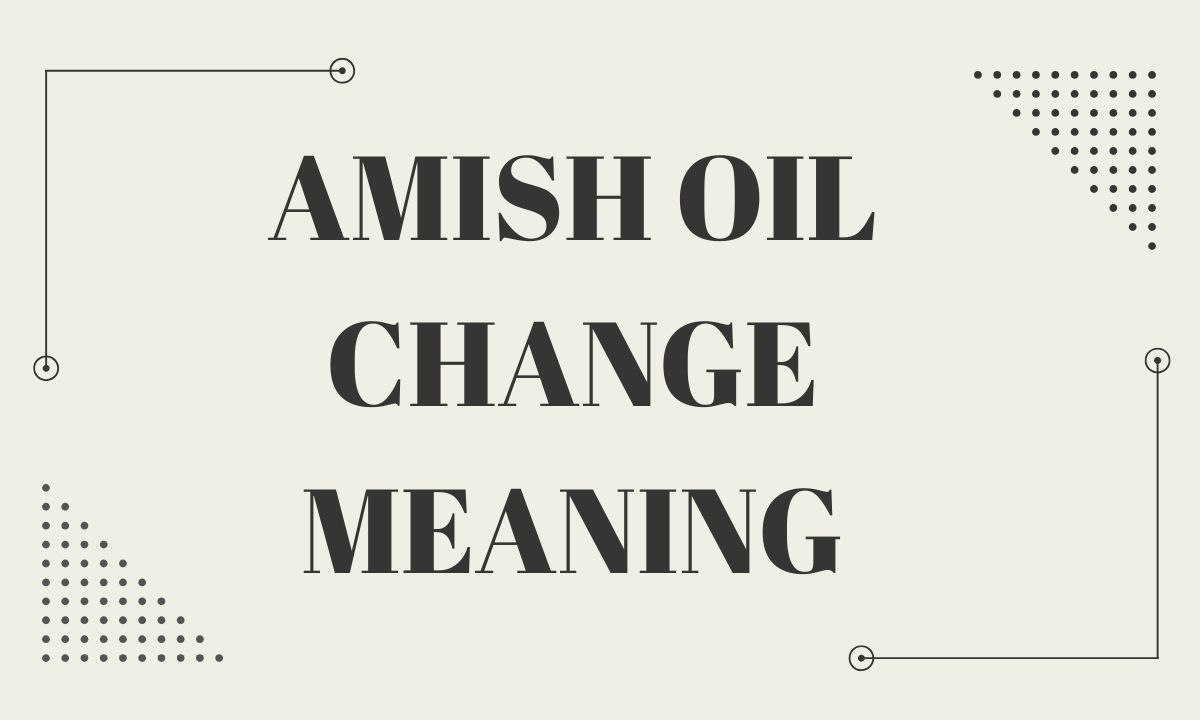The phrase “Amish oil change” might sound unusual at first, but it’s become an intriguing mix of literal, humorous, and slang meanings in modern conversation. Traditionally, the Amish are known for their simple living and avoidance of modern technology, so the term can carry both a literal rural reference and a tongue-in-cheek modern twist.
In today’s world, it often appears in memes, social media jokes, and casual banter, where it can describe anything from a low-tech fix to a clever euphemism depending on context. In this article, we’ll explore the origins, meanings, and evolving interpretations of “Amish oil change” uncovering how it’s used in everyday speech, humor, and online culture in 2025.
The Origins and Meanings of “Amish Oil Change” Slang
The automotive world has long been filled with its own jargon, from mechanical lingo to dealership slang. However, the rise of social media platforms like TikTok has blurred the lines between traditional car talk and internet shock humor. One striking example is the phrase “Amish oil change”, which surfaced around 2011 and gained viral traction online.
This phrase carries two major interpretations, both controversial. The milder one refers to a horse care procedure, where a caretaker manually assists a horse with digestive blockage loosely compared to changing oil. The other, more explicit meaning describes an inappropriate sexual act, which has drawn widespread criticism. Its viral spread highlights how internet culture repurposes taboo subjects for humor, often sparking debate about taste, respect, and cultural sensitivity.
The Broader Environment of Automotive Slang
To truly understand the “Amish oil change” phenomenon, it’s important to view it in the broader landscape of automotive slang. The car industry has long had a vibrant subculture filled with colorful phrases that describe everything from vehicle conditions to customer behavior. Over time, these expressions have shaped the unique language of car dealerships, mechanics, and enthusiasts.
With the rise of social media, this lingo has evolved further, blending humor, exaggeration, and internet trends. The “Amish oil change” slang fits right into this dynamic showing how digital platforms can twist everyday jargon into viral, and sometimes controversial, expressions.
Common Automotive Slang Terms and Meanings
| Term | Meaning |
| Shitbox | A car in poor condition or of little value |
| Tire Kicker | A potential buyer with no real intention to purchase |
| Nickel | Slang for $500 in negotiations |
| Guts | Refers to a car’s interior |
| Headlight | A term for a customer’s credit score |
| Cold Ass | Describes ventilated or cooled seats |
| Christmas Tree | A dashboard with multiple warning lights on |
| Gold Plated | A customer with excellent credit |
| Up | A customer who enters the lot, showing interest |
| Mooch | A customer seeking unrealistic deals |
These slang terms reveal how automotive culture blends practicality and humor, often creating a shared language among insiders.
Controversy Surrounding the “Amish Oil Change” Slang Term
Reasons for Concern
The phrase “Amish oil change” has stirred debate and discomfort across multiple communities due to its dual and often offensive meanings.
- Offensive Definitions: Both interpretations especially the explicit one are viewed as crude and inappropriate.
- Disrespect Toward the Amish: Using “Amish” in this context can appear insensitive to their beliefs and values, trivializing their lifestyle.
- Normalization of Unethical Behavior: The explicit version of the slang crosses moral and legal boundaries, referencing acts that are universally condemned.
- Shock Value and Vulgar Humor: While some internet users treat it as edgy humor, others criticize it as tasteless and disrespectful, raising questions about the limits of online comedy.
In short, the controversy reflects a clash between internet humor culture and the need for respect toward traditional communities like the Amish.
The Amish and Technology
The Amish are well-known for their minimal use of modern technology. Their communities believe in living simply, rejecting items that promote dependency or distract from faith and family. Electricity, automobiles, and powered tools are often avoided, though some Amish groups selectively use technology under strict conditions.
Their resistance to modernization stems from their desire to remain separate from the outside world. This intentional simplicity has made them symbols of old-world craftsmanship and self-reliance, which is why terms like “Amish oil change” draw from the contrast between their humble lifestyle and today’s high-tech culture.
Do the Amish Drive Cars or Trucks?
The Amish generally do not drive cars or trucks, as owning vehicles is considered too worldly and individualistic. Instead, they rely on horse-drawn buggies for transportation and occasionally hire non-Amish drivers for long-distance travel.
Some Amish farmers may use diesel engines or tractors for limited purposes, especially within certain communities that allow mechanical assistance without full modernization. The choice to avoid cars is deeply rooted in religious conviction rather than poverty. Therefore, when people use terms like “Amish oil change,” they’re often playing on this notion of life without automobiles or traditional vehicle maintenance.
How the Amish Maintain Their Equipment (Without Oil Changes)
Despite avoiding modern cars, the Amish are skilled at maintaining their equipment. Many use diesel engines, water pumps, and gas-powered tools to support agricultural work. Maintenance in Amish communities focuses on practicality and durability rather than modern efficiency.
They often hand-lubricate parts, replace worn pieces, and recycle materials to keep machinery functional without depending on automotive services. While they don’t perform “oil changes” like car owners, their methods are eco-friendly and resourceful. This traditional approach to equipment care gives a literal basis to the idea of an “Amish oil change,” emphasizing simplicity over sophistication.
Horse-Drawn Buggies
Horse-drawn buggies are central to Amish transportation and identity. Each buggy is handcrafted, reflecting the community’s commitment to self-sufficiency. These buggies require maintenance, but not in the same way as modern vehicles there’s no engine oil to change. Instead, care involves greasing wheel bearings, repairing harnesses, and keeping wooden parts oiled to prevent cracking.
The phrase “Amish oil change” humorously contrasts the buggy lifestyle with modern car maintenance. For many outsiders, it symbolizes a slower, simpler way of life that values effort and tradition over convenience and speed a defining trait of Amish culture.
Farm Tools and Machinery
Amish farms rely on a mix of traditional and selective mechanical tools. While electricity is often prohibited, air-powered and diesel-powered machinery are common. Tools such as threshers, sawmills, and water pumps may use small engines that need manual care and lubrication. These low-tech machines highlight the Amish’s balance between tradition and practicality.
Their hands-on maintenance reflects skill and resourcefulness, values that inspired humorous terms like “Amish oil change.” The expression reminds people of the ingenuity found in simplicity how even without modern equipment, the Amish continue to thrive through craftsmanship and discipline.
Case Study: Amish Diesel Engines
In some Amish communities, diesel engines are permitted for specific agricultural uses. These engines power everything from grain mills to water pumps, but they’re operated in ways consistent with Amish beliefs. The engines are usually stationary and shared among families to avoid individualism.
Maintenance involves manual oiling and basic repairs, done without electronic diagnostic tools. This method showcases the Amish ability to blend necessity with tradition. While outsiders might joke about an “Amish oil change,” the truth is that the Amish perform highly practical maintenance using mechanical intuition rather than modern technology.
The Origins of the Phrase “Amish Oil Change”
The origin of the term “Amish oil change” is somewhat unclear but likely comes from internet humor and rural slang. It first appeared in online forums and memes, often used to describe rustic or unconventional maintenance.
Over time, it gained traction as a comedic exaggeration mocking the contrast between high-tech auto shops and the Amish’s hands-on, minimalistic approach. Some even use it as a euphemism or joke unrelated to cars, depending on context. Its popularity shows how language evolves, blending cultural stereotypes with playful wit. It’s a perfect example of humor meeting tradition in modern slang.
Modern Usage & Popularity
Today, “Amish oil change” is popular in social media, memes, and informal speech. It can refer to a do-it-yourself fix, a low-tech solution, or even a playful euphemism. People use it to highlight simplicity over sophistication, or as a lighthearted nod to the Amish way of life.
The phrase’s humor lies in its contradiction combining something high-tech like an “oil change” with the Amish’s rejection of modernity. Its versatility has helped it spread widely, from TikTok jokes to Reddit threads, making it a quirky example of how language and culture evolve online.
Common Misconceptions About Amish Oil Changes
A major misconception is that the Amish actually perform something called an “Amish oil change.” In reality, they don’t conduct oil changes on modern cars since they don’t own or drive them. The phrase is largely figurative or humorous, not literal.
Some also assume it’s meant to mock the Amish, but that depends on context. Often, it’s simply a playful cultural reference to their simple lifestyle. Understanding this distinction is crucial to avoid offense and to appreciate the humor respectfully. The term reflects curiosity and irony more than criticism of Amish traditions.
Do the Amish Ever Use Oil Products?
Yes, the Amish do use oil-based products, but not in the modern automotive sense. They rely on lubricating oils for farm equipment, lanterns, and wood care. These practical uses align with their lifestyle, which values function over luxury. Some communities even produce or sell natural oils, such as linseed or lamp oil, for household needs.
So, while an “Amish oil change” doesn’t literally happen in a car garage, oils are still a part of Amish daily life. This subtle connection may have inspired the phrase’s original meaning, linking manual maintenance with rural resourcefulness.
Can the Amish Repair Modern Vehicles?
Surprisingly, some Amish individuals work in or with auto repair shops, especially in mixed communities. They may not own cars, but they possess excellent mechanical skills and craftsmanship. It’s not uncommon for non-Amish business owners to hire Amish workers for wood finishing, engine assembly, or custom repairs.
Their deep understanding of mechanical systems makes them capable of handling modern machinery when necessary. However, this work is often done for income rather than personal use. Therefore, the phrase “Amish oil change” humorously contrasts their mechanical ability with their avoidance of modern vehicle ownership.
Do Amish Communities Have Any Modern Machinery?
While many people assume the Amish reject all modern tools, that’s not entirely true. They often use select technology under strict supervision. For example, air compressors, hydraulic tools, and diesel generators are common in Amish workshops. These machines are considered acceptable because they don’t directly connect to the electrical grid.
Such selective adaptation allows Amish communities to remain productive without compromising their beliefs. The “Amish oil change” phrase might humorously reference these small allowances—where tradition meets limited modernization. It showcases how the Amish balance practicality with faith-based discipline in their daily routines.
Is the Phrase Meant as an Insult?
Generally, the term “Amish oil change” isn’t meant as an insult. It’s used humorously or affectionately to describe simple, old-fashioned, or unconventional methods. However, like many cultural phrases, its tone depends on context.
When used respectfully, it’s just lighthearted rural slang. But when used mockingly, it can be seen as stereotyping Amish communities. The best approach is to understand its origins and avoid using it in a derogatory way. Language evolves, and humor should never come at the cost of respecting others’ beliefs or lifestyles especially communities rooted in simplicity and faith.
Why the Term “Amish Oil Change” Stuck Around
The phrase stuck because it’s memorable, ironic, and funny. It plays on the visual contrast between old-fashioned living and modern technology. Internet culture thrives on such juxtapositions, turning serious traditions into humorous expressions.
Moreover, the Amish way of life fascinates many people, and any phrase tied to their name tends to gain viral attention. Its persistence also lies in its versatility it can mean anything from a literal “manual oiling” to a cheeky euphemism. In short, the term survived because it perfectly represents how language, humor, and culture merge in the digital age.
Conclusion
the phrase “Amish oil change” has evolved far beyond its literal meaning, blending humor, culture, and slang into a unique modern expression. While it may originally refer to a simple or traditional method of maintenance, online it often takes on playful or ironic tones, depending on context.
Understanding its use helps you navigate both rural humor and internet slang with ease. Whether seen as a nod to Amish simplicity or as a viral joke, the term reflects how language continuously adapts and reshapes cultural references. So, the next time you come across “Amish oil change,” you’ll know it’s not just about tools and tractors it’s about how words evolve with wit and creativity .
FAQs About Amish Oil Change Meaning
What is an Amish oil change?
It’s a slang term referring to either a simple, manual method of maintenance or a humorous phrase with a double meaning.
Is an Amish oil change a real automotive procedure?
No, it’s not an actual car service. It’s mostly a joke or slang phrase inspired by Amish simplicity.
Why is it called an Amish oil change meaning?
The name plays on the idea of the Amish living without cars or modern mechanics, making the phrase sound ironic.
Does it have a double meaning or innuendo?
In some cases, yes. Online, people sometimes use it as a playful euphemism, though meanings vary by context.
Is it offensive to Amish culture?
Not inherently, but it can be if used disrespectfully. Understanding context and tone is important before using it.
Should I use this term in a professional setting?
No, it’s best avoided in formal or workplace conversations. The term is informal and often meant for casual humor only.








